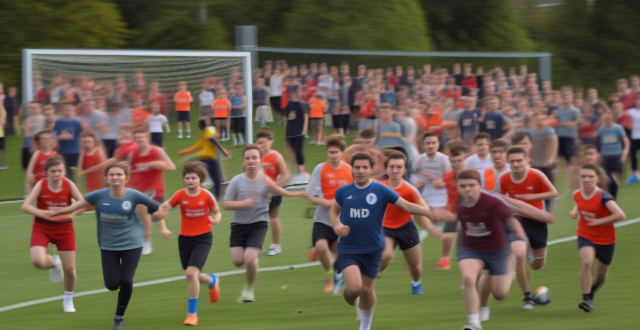Non-disabled individuals can promote inclusion and create equal opportunities in sports for people with disabilities by understanding the issues, spreading information, actively participating, advocating for policy change, promoting role models, and engaging in personal interaction.

How Can Non-Disabled Individuals Support and Advocate for Greater Inclusion and Opportunities in Sports for People with Disabilities?
Introduction
In a world that is becoming increasingly diverse, it's essential to promote inclusivity in all aspects of life, including sports. For non-disabled individuals, supporting and advocating for greater inclusion and opportunities in sports for people with disabilities is not just a moral obligation; it's also an opportunity to create a more equitable society. Here are some ways to make a difference:
Education and Awareness
*Understand the Issues:*
- Research about different types of disabilities and how they impact individuals' abilities to participate in sports.
- Learn about existing barriers such as lack of accessible facilities, limited funding, and societal attitudes.
*Spread Information:*
- Use social media platforms to share stories and achievements of athletes with disabilities.
- Attend or organize workshops and seminars on the topic to educate others.
Active Participation
*Volunteering:*
- Assist at events or competitions specifically designed for athletes with disabilities.
- Offer your skills (e.g., coaching, officiating) to disability sports organizations.
*Join Inclusive Clubs:*
- Enroll in sports clubs that have an inclusive policy towards athletes with disabilities.
- Participate in adaptive sports programs which cater to mixed abilities.
Advocacy and Policy Change
*Support Organizations:*
- Donate time or resources to organizations working towards inclusion in sports.
- Show your support by attending their events or campaigns.
*Lobby for Change:*
- Contact local authorities and sports governing bodies to advocate for better facilities and policies.
- Join advocacy groups pushing for legislation favorable to disability sports inclusion.
Promotion of Role Models
*Highlight Achievements:*
- Follow and share updates from prominent athletes with disabilities.
- Nominate or vote for them in sports awards to increase their visibility.
*Organize Events:*
- Host watch parties for major competitions featuring athletes with disabilities, like the Paralympics.
- Collaborate with local schools to invite these athletes for talks or demonstrations.
Personal Interaction
*Be an Ally:*
- Build friendships with athletes who have disabilities and learn directly from their experiences.
- Listen to their needs and challenges without imposing your own assumptions.
*Encourage Participation:*
- If you're a coach or team leader, actively seek out talent regardless of disabilities.
- Create a welcoming environment where everyone feels valued for their skills rather than their limitations.
Conclusion
By taking these steps, non-disabled individuals can play a crucial role in promoting inclusion and creating equal opportunities in sports for people with disabilities. It’s about making small changes in our daily lives that collectively lead to a significant shift in mindset and action towards a more inclusive society. Let's embrace diversity and celebrate the unique contributions each individual brings to the world of sports.